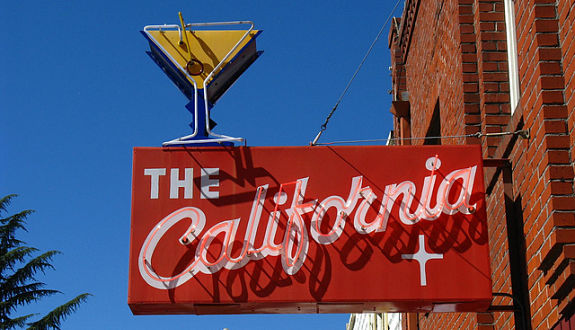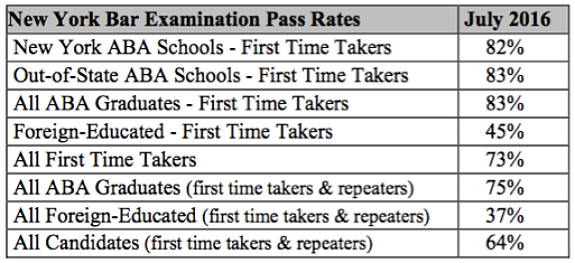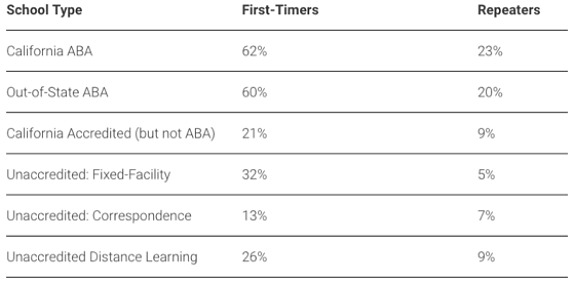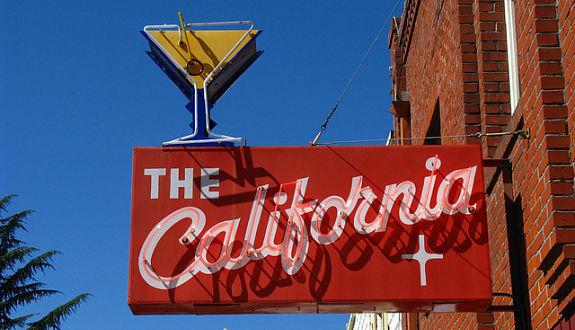
The bar exam is supposed to be a test of minimal competence. You pass, you’re competent enough to be a lawyer. You fail, and, well, you’re incompetent (at least until the next bar exam administration).
But California has always had a reputation for having a very tough bar exam, perhaps going beyond a test of minimal competence. In fact, the passage rates for the California Bar Exam are so low that now it seems that the cut-off score for passing the bar in California will be lowered by the Supreme Court of California (the legal profession in each state is regulated by that state’s highest court) sometime in the fall or winter. What’s more, the new, lower cut-off will apply retroactively to people who fail the exam this July.
The reason for this score shakeup is that the California Bar Exam is too tough. Let’s see how tough it really is.
Here are the results of last July’s bar exam for New York and California.

Source: New York bar pass rates by school

Source: California bar pass rates by school
So why are the passage rates in California so much lower than in New York? One explanation is that California is the only state to allow grads from non-ABA accredited law schools to sit for the bar exam. While these people do drag down the overall pass rate, that’s not the whole story. The most relevant point of comparison is the pass rate of first-time takers attending ABA-accredited law schools.
The California ABA first-timer pass rate is 62%, whereas for New York the pass rate is 82%. So either California’s ABA schools are worse than New York’s ABA schools, or the California Bar Exam is just tougher.
So let’s look at some particular, comparable ABA schools from both states. We’ll use LSAT scores and undergraduate GPAs, since law school doesn’t really prep you for the bar exam any way.
First up with have Cornell Law School—which has about a 167 median LSAT and about a 3.74 median GPA—and UC Berkeley—which has about a 166 median LSAT and about a 3.78 median GPA. Any difference between the two schools in student aptitude as measured by GPA and LSAT scores is completely insignificant. So how are these two schools doing on their respective bar exams?
Cornell banged in an impressive 92% pass rate on the July 2016 New York Bar Exam. Compare that to UC Berkeley where only 84% passed the California Bar Exam. Ouch.
What about Stanford (171, 3.89) and Columbia (171, 3.7)? Well, 96% of Columbia grads passed the July 2016 New York bar exam, whereas Stanford managed to pass only 91% of its graduates. Stanford’s bar pass rate is pretty close to the pass rate at the Syracuse University College of Law (pass rate: 89.5; 154, 3.33). Just tear up your Stanford acceptance letter and go to Syracuse instead.
And how about one more? Let’s look at Fordham (163, 3.53) and UC Davis (163, 3.51). Fordham grads enjoyed an 88% pass rate. UC Davis, on the other hand, had a 72% pass rate.
Okay, so California ABA schools aren’t worse. It really seems like the California Bar Exam is tougher.
Now, moving the cut-off score down so that Stanford grads can keep up with Syracuse grads makes sense. But what would really make a lot more sense, given the California Supreme Court’s goal of making the California Bar Exam more “uniform” with the rest of the country, is for California to join New York and switch to the Uniform Bar Exam. It’s got “uniform” right in the name!
Anyway, good luck to all California July bar takers! And I wish the best of mental health to folks that fail this July only to be retroactively passed.




